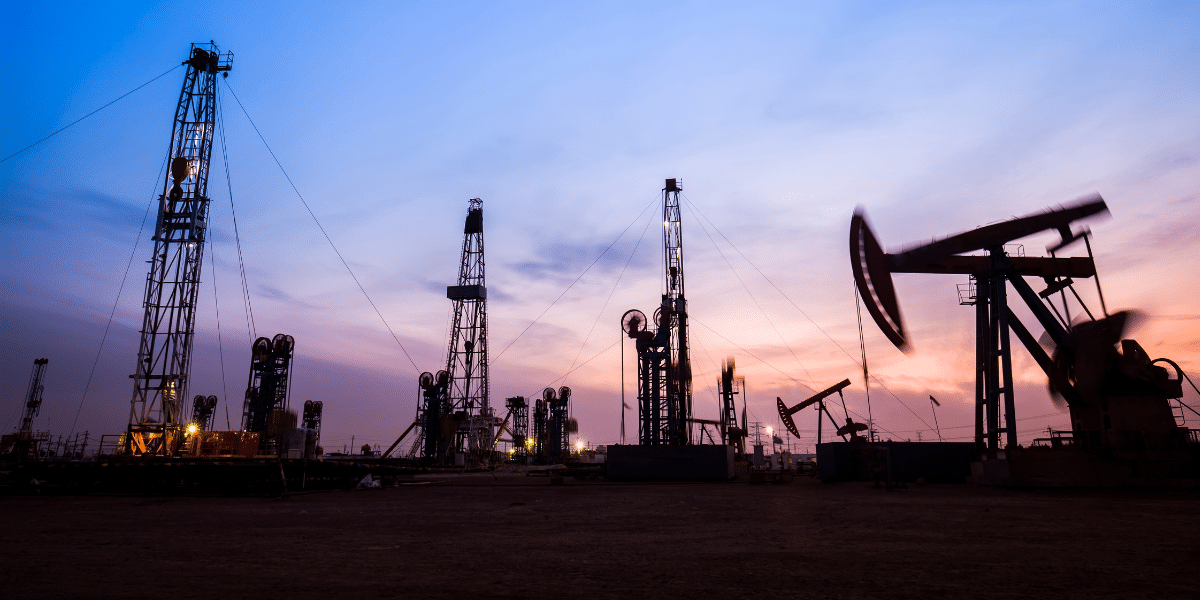
Oilfield production chemicals are specialized solutions that help keep oil and gas wells running safely and efficiently. They protect equipment, maintain flow, and improve the quality of produced oil. These chemicals are used throughout drilling, production, and midstream operations to solve challenges such as corrosion, mineral deposits, and separation of oil from water.
Core Categories of Oilfield Production Chemicals
Each type of production chemical addresses a specific problem in the field. Here are the most common groups:
Corrosion Inhibitors
Most oilfield corrosion occurs through electrochemical or chemical reaction, like with salt water or acid, with metal surfaces, causing degradation of the integrity of the material. Corrosion inhibitors work by creating a barrier between the reactant and the surface.
Application and Dosage: Commonly applied by continuous injection through chemical pumps, or in batch treatments during maintenance. Dosage depends on fluid composition, pressure, and metallurgy. Performance is tracked using corrosion coupons, probes, or iron counts.
Scale Inhibitors
Scaling happens when changes in pressure and temperature make salts like calcium carbonate or barium sulfate insoluble, leading to hard deposits inside wellbores, tubing, and pipelines. These deposits restrict flow and can damage equipment. Scale inhibitors disrupt crystal growth and keep salts dissolved to prevent buildup.
Application and Dosage: Delivered through continuous injection into production systems or applied as squeeze treatments into the formation. Selection and dosage depend on water chemistry and scaling tendency.
Paraffin & Asphaltene Inhibitors
Deposits of paraffin and asphaltenes occur when crude oils become unstable, often due to drops in pressure or temperature. Waxes solidify and heavy hydrocarbons aggregate, narrowing tubing and pipelines and restricting flow. Inhibitors work by dispersing deposits, modifying crystal formation, or altering solubility so that hydrocarbons remain transportable.
Application and Dosage: Typically injected at the wellhead or into pipelines. Treatment rates may vary with seasonal temperature changes and crude properties.
Demulsifiers
Crude oil often contains natural surfactants such as asphaltenes and resins that stabilize oil-water emulsions, making them difficult to separate. Demulsifiers disrupt these stabilizing agents, allowing oil, water, and solids to separate more efficiently and improving crude quality.
Application and Dosage: Added upstream of separators or heater treaters. Programs are refined with laboratory bottle tests and adjusted in the field to match crude composition.
Water Clarifiers & Flocculants
Produced water often contains fine oil droplets that are difficult to separate. Clarifiers and flocculants bring these droplets together so they separate more easily, improving water treatment.
Application and Dosage: Injected into produced water prior to separation or disposal. Program design depends on water quality and throughput requirements.
Other Specialty Oilfield Production Chemicals
In addition to the core categories above, operators sometimes use specialty chemicals depending on field conditions:
- Biocides: Control bacterial growth and prevent microbiologically influenced corrosion.
- Hydrate Inhibitors: Prevent ice-like blockages in cold or high-pressure flowlines.
- Drag Reducing Agents (DRAs): Reduce pipeline friction, increasing throughput.
- Defoamers/Antifoams: Control foam in separators to stabilize processing.
These oilfield production chemicals are applied more selectively but play an important role when specific risks arise.
Quick Reference Table
| Chemical Type | Problem Solved | Benefit |
| Corrosion Inhibitors | Internal pipeline and equipment corrosion | Longer asset life, reduced failures |
| Scale Inhibitors | Mineral deposits blocking flow | Fewer workovers, steady production |
| Paraffin & Asphaltene Inhibitors | Wax and heavy hydrocarbon buildup | Maintained flow capacity, lower downtime |
| Demulsifiers | Stable oil-water emulsions | Improved crude quality, better separation |
| Biocides | Bacterial growth, souring, MIC | Safer operations, less corrosion |
| Hydrate Inhibitors | Hydrate blockages in flowlines | Prevented flow stoppages |
| Drag Reducing Agents | Friction in pipelines | Higher throughput, lower pumping costs |
| Defoamers/Antifoams | Foam in separators | Stable separation processes |
| Water Clarifiers & Flocculants | Oil droplets in produced water | Cleaner water for reinjection/disposal |
Chemical Program Design: The “Why” Behind Selection
The choice of chemicals and dosage depends on specific field conditions. Operators design programs using:
- Fluid Analysis: Laboratory tests on produced water, crude, and gas reveal risks such as scaling, wax, emulsions, or microbial activity.
- Operating Conditions: Temperature, pressure, and system layout affect which chemicals will be effective.
- Field Trials: Pilot programs confirm lab findings under actual production conditions.
- Monitoring & Adjustment: Continuous monitoring using probes, coupons, and digital platforms allows dosage to be fine-tuned as conditions change.
These programs are applied at multiple stages of a well’s life:
- Drilling & Completion – Friction reducers and stabilizers improve well construction.
- Production Phase – Flow assurance chemicals (scale, paraffin, hydrate control) and separation aids (demulsifiers, clarifiers) keep wells producing.
- Midstream – Corrosion inhibitors, drag reducers, and water treatment chemistries protect gathering systems and pipelines.

Cost & Value Perspective
Chemical programs directly affect financial performance as well as operations. By reducing unplanned downtime and extending asset life, they protect both production and capital.
Field studies show that optimized programs can increase recovery and net present value (NPV). For example, operators using Imperative’s OPTIS® workflow have reported multi-million-dollar gains compared to conventional treatments. These results demonstrate how chemical strategy is not only about maintaining flow, but also about maximizing return on investment.
Get Better Results with Imperative Chemical Partners
Operators need more than chemicals. They need a partner with the expertise, technology, and scale to design programs that deliver results. Imperative Chemical Partners combines advanced laboratory workflows, experienced field service, and digital program management to help operators maintain reliable production and stronger returns.
Imperative is a trusted chemical solutions company supporting over 85,000 wells and 45,000 miles of midstream infrastructure.
Reach out today for more information.
